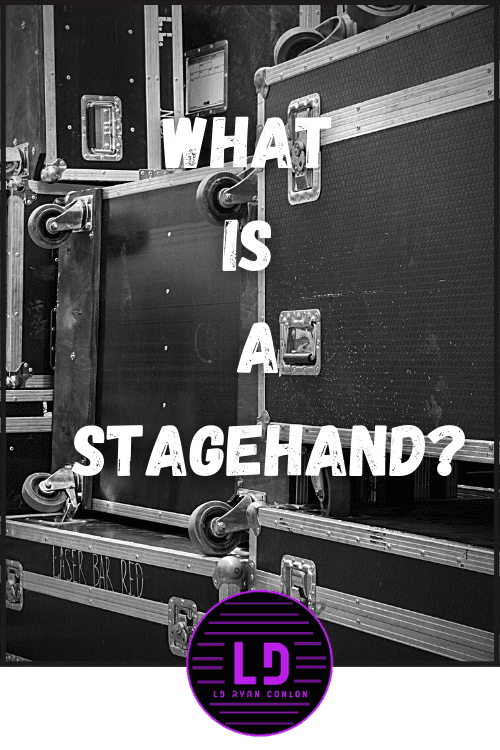Have you ever seen a live performance and thought to yourself, how do they make that all happen? Most people have no idea what goes into putting on a show.
Behind the scenes, there is a whole team of professionals who work tirelessly to make sure everything runs smoothly.
Today, we’re going to take a look at one of those jobs: Stagehand. What does this job entail? What skills do you need? Keep reading to find out!
What is a stagehand?
A stagehand is an integral member of the production team for any theater performance or film. From television shows to Broadway plays, stagehands play a vital role in setting up and maintaining the show.
Their duties may include anything from moving scenery, loading props onto the stage, helping actors prepare their costumes and makeup, and assisting with general operations behind-the-scenes.
Generally speaking, stagehands can anticipate long hours on their feet in a busy work environment. They must possess strength and agility to competently manage large pieces of equipment and scenery, as well as keep track of numerous details before and during performance times.
Furthermore, they should also possess excellent problem-solving skills to be able to effectively troubleshoot any issues that arise during a show’s run.
In addition to being physically demanding and mentally taxing jobs, stagehands are often highly sought after due to their versatility and experience working on a wide variety of productions.
Being successful in this industry requires one to display knowledge of production tools while also possessing strong customer service skills so they can effectively communicate with producers managers, directors and talent – all with grace under pressure.
Those who are willing to put in the long hours with passion will reap abundant rewards as a successful stagehand in theater or film industry.
Overall, learning what it takes to become a reliable stagehand is an opportunity well worth exploring if you have ever been interested in concerts, corporate meetings, theater or film making!
What do stagehands do?
Stagehands are essential to any large-scale event, providing the technical expertise needed to create and maintain an impressive atmosphere. Their primary duties involve the unloading, setup and loading of sound, lighting and video equipment from and to trucks.
This includes heavy lifting roadcases cables, tools, lights, speakers and other pieces of technology. Working quickly and efficiently is key for stagehands – often there are tight turnaround times between shows, with little time for error or trial-and-error.
Further tasks may include helping with light focus or performing basic sound checks on microphones and verifying that all technical elements coordinate properly.
It takes a unique level of experience to be able to handle the intense conditions provided by a large show without cracking under pressure – it is those who can do this that turn an average performance into something truly remarkable.
The efforts of stagehands often go unrecognized by spectators, but their contributions really do lie at the heart of an unforgettable show. It should always be remembered how much hard manual labor goes into getting these events off the ground!
How do I become a stagehand?
Becoming a stagehand is a great way for those interested in theater, production, and the arts to make a living.
Working as a stagehand requires knowledge of specialized tools and equipment, but is considered a very rewarding job due to the diverse responsibilities and the unique behind-the-scenes experience it provides.
One of the best ways to start on this career path is to get involved in community theaters as an stagehand, carpentry assistant, or other performance technician roles.
It’s essential to gain an understanding of set designs, lighting equipment, sound systems, rigging systems and various types of theater sets while working with experienced professionals who can provide guidance.
Once you have accumulated enough experience and expertise in the area of stagecraft, start looking for jobs via Stagehands union such as IATSE for long term employment that can offer more stability and benefits.
After proving yourself to be reliable and knowledgeable with your previous work experience, you may be given higher level opportunities for professional production houses that can offer well paid work with associated perks.
Becoming a successful stagehand requires hard work with specialized skills – but if you’re willing to put in the time and effort – then you can travel along an enjoyable journey through learning and exploring new experiences in theater performance.
So take the first step today – do your research on available positions – there is no time like now! Good luck!
What are the benefits of being a stagehand?
Working as a stagehand is an essential job if you’re looking to break into the entertainment industry. It can be a very rewarding role that provides valuable experience and encourages personal growth.
One of the main benefits of being a stagehand is the opportunity to learn new skills, ranging from rigging equipment and set construction to backstage management and sound engineering.
Working as part of a team helps sharpen communication skills and teaches how to handle pressure gracefully.
In addition, stagehands are often able to make meaningful connections with their colleagues, resulting in lasting relationships across different areas of production.
For those looking for more creative fulfillment, the hands-on nature of being a stagehand allows for plenty of experimentation and exploration with new ideas.
There may not always be glamour but the benefits that come along with being a stagehand are certainly worth it!
What is the difference between a stagehand and a technician?
On the surface, a stagehand and technician may look very similar. Both are necessary members of any theatrical production, providing technical assistance both on-stage and offstage. But they have very different roles when it comes to theater work.
Generally, stagehands are responsible for physical tasks such as moving and setting up equipment, constructing or tearing down sets, and arranging props.
On the other hand, technicians focus on electrical and sound equipment, ensuring that all sound systems are operating properly, lighting and LED effects are working correctly, microphones are in optimal condition for use during performances, etc.
In essence, stagehands oversee the physical aspects of production while technicians maintain the technical systems used during shows.
Although their roles may overlap from time to time–and very often the same person can perform both jobs–stagehands and technicians together make sure that a performance runs smoothly from beginning to end.
What are some of the best stagehand tips and tricks?
As a stagehand, there is no shortage of tricks for making your job easier and more efficient. One key piece of advice is to be organized and work in advance.
When it comes to setting up for a performance, last-minute changes are common, so having the necessary components already on hand can make the process much smoother.
It’s also essential to have a plan of action with clear goals and tasks that need to be completed in a timely manner.
Additionally, being able to troubleshoot on the fly is incredibly useful: an eye for detail and being able to find quick fixes can save hours of reworking later on.
Aside from these hard skills, good communication with everyone involved—from stage managers to actors—is vital.
Knowing how your actions impact others will lead you and those around you towards success on opening night.
With these insider tips, becoming an effective stagehand is relatively straightforward!
What skills do you need to be a stagehand?
If you want to become a stagehand, there are certain skill sets and traits that can help you excel in this industry.
Stagehands are responsible for taking on a wide range of tasks before, during, and after performances including setting up sets, positioning lights and audio equipment, running cues, and tearing down stages afterwards.
As such, successful stagehands need to be hardworking and reliable since they’re often working long hours in the hot spotlight or dark backstage corners.
In addition to having great physical endurance, they also need to possess excellent organizational skills to ensure everything is set up correctly and promptly.
Attention to detail is essential since furniture placement can have an effect on audience sight lines while technical errors can delay the show or cause other issues.
Teamwork is also key since stagehands often collaborate with each other as well as tech crew and performers when coordinating tasks like scene changes or prop changes.
Finally, aspiring stagehands should strive for flexibility since event requirements can vary widely from one night to the next.
With positive attributes like these working in their favor, hopeful candidates will have a great chance of becoming a successful stagehand!
Do stagehands travel?
While most stagehands are usually based in their local area at either a single venue or multiple theaters in close proximity, many stagehands also travel as part of their job.
The demands of ever-changing entertainment schedules often require traveling stagehands to assist with last minute set changes or other essential tasks.
Such work can include joining nationwide tours such as a Broadway play or setting up individual events like concerts or trade shows.
Not only does working in different locations create variety and intense work experiences, it also allows many stagehands to expand their skill set by implementing those innovations they’ve encountered on the road back home.
Whether they’re staying local or taking their show on the road, it’s clear that the role of a stagehand is dynamic and integral to any successful performance.
Conclusion
A stagehand is a technical theater professional who works primarily in live entertainment. A large part of a stagehand’s job is to set up and strike scenery, which includes moving equipment and furniture on and off the stage.
Stagehands also work with lighting, video and sound equipment. They may be responsible for operating spotlights or other lights during a show, as well as running soundboards or other audio equipment.
In addition to their behind-the-scenes work, stagehands are often called upon to help with onstage activities such as props, costumes, or line cues.
So if you’re looking for an exciting and challenging job, consider becoming a stagehand.
Read More
- Union vs Non-Union Stagehand Jobs: Pros and Cons
- Stagehand Tool List | 11 Useful Tools | Always Bring a Crescent Wrench
Pins for Pinterest
If you like what you see, feel free to share some love on Pinterest <3

Ryan Conlon is a highly experienced Corporate Freelance Lighting Designer with two decades of dedicated work in the entertainment industry. With a passion for creating captivating lighting experiences, Ryan has contributed his expertise to numerous corporate meetings, stage productions, concerts, and events throughout his career.


